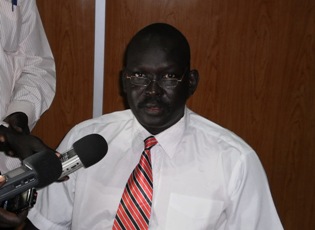South Sudan asks Khartoum to end “bombardment” of border areas
January 4, 2012 – (BENTIU/JUBA) — South Sudan’s President Salva Kiir Mayardit on Wednesday, described the Republic of Sudan as “main challenge” to the world’s newest nation, as Juba accuses Khartoum of more bombings.
The two countries have had a tense relationship since South Sudan seceded in July as part of a 2005 peace deal that ended decades of conflict in which two million died.
“All our challenges come from Sudan”, he said, adding that landlocked South Sudan had peaceful relations with its other five neighbours.
Sudan remained a “thorn” in the side of country, which is one of the poorest in the world. Since independence in July South Sudan has been blighted by rebellions, cattle rustling, violence between ethnic groups and sporadic border skirmishes with north Sudan Armed Forces.
On Sunday the spokesperson of the South Sudanese government, Barnaba Marial Benjamin, accused Sudan’s military (SAF) of bombing Raja County of Western Bahr-al-Ghazal state killing nearly 40 people.
Sudan has always denied bombing South Sudanese territory saying that any bombings took place in north Sudanese territory, claiming that the attacks were against rebels fighting Khartoum government.
Marial told the Sudan Radio Service on 1 December that South Sudan’s President Salva Kiir Mayardit has warned Khartoum over the issue.
“The president has sent a message to the Republic of Sudan in Khartoum that they should not engage in hostilities by actually getting unlawfully into the sovereign state of the Republic of South Sudan.”
As well as Western Bahr-al-Ghazal, South Sudan has also accused SAF of bombing its territory in Upper Nile, Unity, NorthernBahr-al-Ghazal states.
In an address on South Sudan TV on Wednesday Kiir said that his country was trying to avoid responding to Khartoum’s “provocations”.
He expressed hope that the two countries would reach a compromise to establish mutual bilateral ties during upcoming negotiations over oil, the contested border and other issues.
The President also claimed that Khartoum was indirectly responsible for the recent violence among the Luo-Nuer and Murle ethnic groups in Jonglei state, as they had helped arm rebel groups in the region. Khartoum denies this and counters that Juba supports rebels in its territory.
The country’s first President also warned South Sudanese politicians not to instigate tribal conflict. Between 20,000 to 50,000 have been displaced according the UN and hundreds expected to have been killed, in the Luo-Nuer’s revenge attack.
BORDER BOMBINGS
In November 2011 the UN accused Sudan of bombing a refugee camp in South Sudan’s Unity state, raising fears among analysts of a return to war, for the first time since a 2005 peace deal. South Sudan says 12 people died and 20 people were injured in the bombing.
The bombings are part of Khartoum’s efforts to destabalise the nascent nation, according to Juba, in order to regain control of South Sudan’s oil fields. Clashes along the border between South Sudanese rebels – described as “mercenaries” of Khartoum by Juba – and on a small scale between the two sides’ armies have been sporadic since Sudan’s independence in July 2011.
Recent reports indicate that both sides are continuing to reinforce their forces by the border but analysts believe an return to all out conflict is unlikely.
An October report from the Small Arms Survey research group said that the condition, amount and country of origin of the weapons seized from rebel groups in South Sudan raised ‘questions about possible […] relationships with Khartoum.’
Responding to the South Sudan’s claims, SAF spokesman Al-Sawarmi Khalid has previously dismissed the accusations. “We have no war or conflict with the government of South Sudan,” he told Reuters in November. “This information is not correct.”
During the SPLA’s two-decade civil war with Khartoum some southern groups fought alongside SAF against the SPLA. As part of the 2005 peace deal these groups were either taken into the SPLA or formed elements of joint SPLA-SAF units, which would have formed the basis for a national army had the south not opted for independence in a referendum in January this year.
SAF have been fighting rebels in the north Sudan states of South Kordofan – since June – and Blue Nile – since August – who fought with South Sudan during the civil war. Khartoum says that the groups are still backed by Juba, although this is denied by Juba and the rebels.
OIL IN UNITY STATE
South Sudan’s President claimed in November that Khartoum’s bombing campaign in Unity state was preparation for a land invasion into South Sudan, which took with it 75% of Sudan’s oil revenue when it seceded. Most of South Sudan’s oil fields are near the shared border.
Sudan’s denial that it was responsible for the November bombing was described as a “blatant lie” by a US diplomat. Khartoum’s representative at the UN told the press that Reuters and the BBC, whose reporters witnessed the bombings, were “biased” news organisations.

The UN peacekeeping chief Herve Ladsous told the UN Council that United Nations Mission in South Sudan (UNMISS) has “confirmed that the Sudan Armed Forces dropped at least two bombs near the Yida refugee camp”.
BBC and Reuters reports indicate that five bombs were dropped. One bomb, which did not explode, landed near a school.
However, SAF spokesman Sawarmi told AFP, “This information is completely false. We didn’t bomb any camps or any areas inside the borders of South Sudan”.
(ST)
